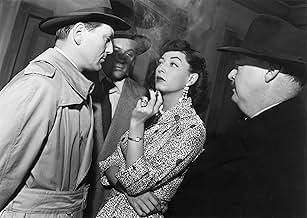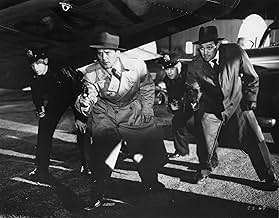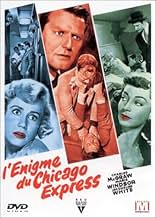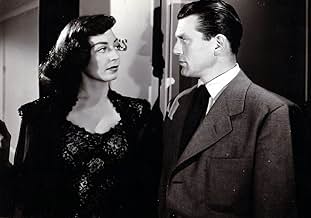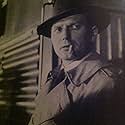VALUTAZIONE IMDb
7,6/10
9380
LA TUA VALUTAZIONE
Una donna che intende testimoniare contro un'organizzazione criminale deve essere protetta dagli assassini durante il viaggio in treno da Chicago a Los Angeles.Una donna che intende testimoniare contro un'organizzazione criminale deve essere protetta dagli assassini durante il viaggio in treno da Chicago a Los Angeles.Una donna che intende testimoniare contro un'organizzazione criminale deve essere protetta dagli assassini durante il viaggio in treno da Chicago a Los Angeles.
- Regia
- Sceneggiatura
- Star
- Candidato a 1 Oscar
- 1 candidatura in totale
Peter Brocco
- Vincent Yost
- (non citato nei titoli originali)
Ivan Browning
- Waiter
- (non citato nei titoli originali)
George Chandler
- Accomplice Running Newsstand
- (non citato nei titoli originali)
James Conaty
- Tenant in Apartment House Hallway
- (non citato nei titoli originali)
Don Dillaway
- Reporter
- (non citato nei titoli originali)
Franklyn Farnum
- Train Passenger
- (non citato nei titoli originali)
Bess Flowers
- Wagon Restaurant Diner
- (non citato nei titoli originali)
Don Haggerty
- Det. Wilson
- (non citato nei titoli originali)
Recensioni in evidenza
Here's an overlooked classic that more than holds its own over five decades after its release. Two-fisted detective Charles McGraw must protect a crucial witness (Marie Windsor) on a train trip from Chicago to Los Angeles. Since keeping a secret is hard, bad guys who aren't so keen on Windsor's testimony are also on board -- and will stop at nothing to silence her. Further complexities are added to an already tense situation when the hit men confuse another passenger as their target.
"The Narrow Margin" is known as a B movie, but you'd never know it from watching it. True, the film isn't flashy, but it does make the most out of everything it has. The story is original and full of twists, the suspense terrific and the acting memorable. With its creative take on what should be a simple story, and with its colorful characters and sharp direction, it's all more than a bit reminiscent of the master himself, Alfred Hitchcock. You won't regret picking this one up now that it's available on DVD.
"The Narrow Margin" is known as a B movie, but you'd never know it from watching it. True, the film isn't flashy, but it does make the most out of everything it has. The story is original and full of twists, the suspense terrific and the acting memorable. With its creative take on what should be a simple story, and with its colorful characters and sharp direction, it's all more than a bit reminiscent of the master himself, Alfred Hitchcock. You won't regret picking this one up now that it's available on DVD.
This was the "original" and, like its re-make "Narrow Margin" (the "The" is missing), it is excellent. This is one of those rare cases in which the old and the new versions both are top-notch.
In fact, it's interesting to compare the two versions. In this film, there is a very unique twist as the end concerning the woman being brought to Los Angeles. It was clever.
That woman in this 1952 version also is played by perhaps the First Lady Of Noir, Marie Windsor. She had the best lines in the film and is outstanding at playing the tough-talking moll of this genre. (See Stanley Kubrick's "The Killing" to fully appreciate more of Windsor's work.)
The film noir tough-guy male equivalent of her also stars in this film: Charles McGraw. Few guys ever looked and sounded better in noirs than McGraw. He and Windor were born to play in 'B' crime movies!
The short length of this film makes it a good one to watch anytime although, to be frank, if I could only own one of the two "Narrow Margin" films, I'd have to take the latter-day version with Gene Hackman and Anne Archer, but it would a tough decision. Both have a lot to offer.
In fact, it's interesting to compare the two versions. In this film, there is a very unique twist as the end concerning the woman being brought to Los Angeles. It was clever.
That woman in this 1952 version also is played by perhaps the First Lady Of Noir, Marie Windsor. She had the best lines in the film and is outstanding at playing the tough-talking moll of this genre. (See Stanley Kubrick's "The Killing" to fully appreciate more of Windsor's work.)
The film noir tough-guy male equivalent of her also stars in this film: Charles McGraw. Few guys ever looked and sounded better in noirs than McGraw. He and Windor were born to play in 'B' crime movies!
The short length of this film makes it a good one to watch anytime although, to be frank, if I could only own one of the two "Narrow Margin" films, I'd have to take the latter-day version with Gene Hackman and Anne Archer, but it would a tough decision. Both have a lot to offer.
Trains have it all over ships and planes when it comes to creating a microcosm. On an airplane, everybody's crammed together; nobody can sneak on or leave (except by parachute or defenestration). An ocean liner has its private staterooms and public spaces, but, again, is an island, entire onto itself. But trains stop regularly to take on and disgorge passengers, and they run along their fixed and earthbound course, with windows looking out on rivers and highways, at big cities at high noon and small towns in the dead of night. And so they've always been the preferred vehicle for suspense, with countless thrillers using the rails as their setting. One of the tautest and most toothsome, in its modest, low-budget way, is Richard Fleischer's The Narrow Margin.
It opens in Chicago, where a pair of Los Angeles police detectives are to escort the widow (Marie Windsor) of a recently slain gang leader back to the coast to testify before a grand jury. She's a hard case (`a 60-cent special...poison under the gravy'), and guarding her is a dangerous job. Sure enough, one of the cops takes a fatal bullet in the stairway of her low-rent apartment house (she shows scant sympathy). Windsor's finally smuggled aboard the train, in a Pullman car's locked compartment adjoining that of her custodian Charles McGraw. Almost certainly, one or more mobsters followed her. It's up to McGraw to smoke them out before they kill Windsor, who knows too much. But he slowly learns that some vital information has been deliberately kept from him....
Fleischer makes inventive use of the jostling in the cramped passageways and of the all but vanished rituals of club cars and dining cars. He packs the train with seasoned character actors, notable among them Jacqueline White, Paul (`Nobody loves a fat man') Maxie, and Don Beddoe. The closely worked script, by Earl Fenton (based on a novel by Martin Goldsmith, who also penned the original material for Detour), doesn't stint on gaudy patter for them to spout (it's a moveable feast of salty epigrams).
Best of all, The Narrow Margin offers the addictive Marie Windsor her meatiest role, showcasing her tough-gal talents. Rolling her huge and extraordinary eyes, she aims her exhaled smoke like a stream of deadly gas and hard-boils her lines into hand grenades (to McGraw: `This train's headed straight for the cemetery. But there's another train coming along a gravy train. Let's get on it.'). It's one of Hollywood's more perplexing secrets why Windsor toiled exclusively, with the possible exception of her Sherry Peatty in Stanley Kubrick's The Killing, in the B-movie ghetto. But she helped make that ghetto the liveliest part of Tinsel Town.
It opens in Chicago, where a pair of Los Angeles police detectives are to escort the widow (Marie Windsor) of a recently slain gang leader back to the coast to testify before a grand jury. She's a hard case (`a 60-cent special...poison under the gravy'), and guarding her is a dangerous job. Sure enough, one of the cops takes a fatal bullet in the stairway of her low-rent apartment house (she shows scant sympathy). Windsor's finally smuggled aboard the train, in a Pullman car's locked compartment adjoining that of her custodian Charles McGraw. Almost certainly, one or more mobsters followed her. It's up to McGraw to smoke them out before they kill Windsor, who knows too much. But he slowly learns that some vital information has been deliberately kept from him....
Fleischer makes inventive use of the jostling in the cramped passageways and of the all but vanished rituals of club cars and dining cars. He packs the train with seasoned character actors, notable among them Jacqueline White, Paul (`Nobody loves a fat man') Maxie, and Don Beddoe. The closely worked script, by Earl Fenton (based on a novel by Martin Goldsmith, who also penned the original material for Detour), doesn't stint on gaudy patter for them to spout (it's a moveable feast of salty epigrams).
Best of all, The Narrow Margin offers the addictive Marie Windsor her meatiest role, showcasing her tough-gal talents. Rolling her huge and extraordinary eyes, she aims her exhaled smoke like a stream of deadly gas and hard-boils her lines into hand grenades (to McGraw: `This train's headed straight for the cemetery. But there's another train coming along a gravy train. Let's get on it.'). It's one of Hollywood's more perplexing secrets why Windsor toiled exclusively, with the possible exception of her Sherry Peatty in Stanley Kubrick's The Killing, in the B-movie ghetto. But she helped make that ghetto the liveliest part of Tinsel Town.
The Narrow Margin is excellent. It's too bad more of our new directors have forgotten how to make a great film with a minimal budget, using instead inventive camera angles, good characters and dialog, and some surprises along the way. I really loved Marie Windsor as the mobster's wife who's going to LA to sing to the Grand Jury. She's one of the toughest broads I've ever seen! Charles McGraw does his standard tough cop role and turns in a performance that sets the standard by which all others are judged.
This is the original, and beats the heck out of the re-make.....
This is the original, and beats the heck out of the re-make.....
While director Richard Fleischer gets plenty of credit for his role in making the film noir classic "The Narrow Margin" on a shoestring budget, it is hard to imagine this picture without actor Charles McGraw in the lead role. As a tough cop escorting a witness to testify in Los Angeles, McGraw's performance is what holds the picture together. Try to think now of one actor around today who could portray a cop who is at times calculating, other times sarcastic and almost always menacing. In the Hollywood of the 1940s and 50s,Charles McGraw usually played secondary roles in A pictures. In "The Narrow Margin," McGraw shows that with a competent director, he could put on some performance as the star of a movie.
Lo sapevi?
- QuizIn preference to removing various walls from the sets, director Richard Fleischer decided to make extensive use of a handheld camera that could be brought into rooms; this was one of the first films to do so. To save money, the train sets were rigidly fixed to the floor and the camera was moved to simulate the train rocking.
- BlooperThere are palm trees at the Denver train station.
- Citazioni
Walter Brown: Pardon me, I'd like to get through.
Jennings: Sorry, this train wasn't designed for my tonnage, heh. Nobody loves a fat man except his grocer and his tailor!
- Versioni alternativeAlso available in a computer colorized version.
- ConnessioniFeatured in Hollywood the Golden Years: The RKO Story: Howard's Way (1987)
I più visti
Accedi per valutare e creare un elenco di titoli salvati per ottenere consigli personalizzati
- How long is The Narrow Margin?Powered by Alexa
Dettagli
Botteghino
- Budget
- 188.000 USD (previsto)
- Tempo di esecuzione1 ora 11 minuti
- Colore
- Proporzioni
- 1.37 : 1
Contribuisci a questa pagina
Suggerisci una modifica o aggiungi i contenuti mancanti

Divario superiore
By what name was Le jene di Chicago (1952) officially released in India in English?
Rispondi

